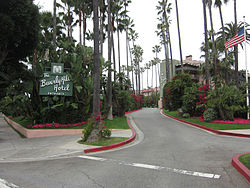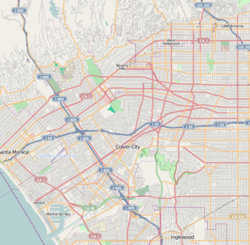Beverly Hills Hotel
| The Beverly Hills Hotel | |
|---|---|
 
|
|
|
Location in Beverly Hills/Western Los Angeles Area
|
|
| General information | |
| Location | Beverly Hills, California |
| Address | 9641 Sunset Boulevard |
| Coordinates | 34°4′53.17″N 118°24′49.29″W / 34.0814361°N 118.4136917°WCoordinates: 34°4′53.17″N 118°24′49.29″W / 34.0814361°N 118.4136917°W |
| Opening | May 12, 1912 |
| Management | Dorchester Collection |
| Design and construction | |
| Architect | Elmer Grey |
| Developer | Margaret & Stanley Anderson |
| Other information | |
| Number of rooms | 208 guest rooms and suites, including 23 bungalows |
| Number of restaurants | The Polo Lounge The Cabana Café The Fountain Coffee Room Bar Nineteen 12 |
| Parking | Valet Parking |
| Website | |
| The Dorchester Collection | |
The Beverly Hills Hotel, also called The Beverly Hills Hotel and Bungalows, is located on Sunset Boulevard in Beverly Hills, California. One of the world's best-known hotels, it is closely associated with Hollywood film stars, rock stars and celebrities. The hotel has 208 guest rooms and suites, and 23 bungalows, each designed in the peachy pink and green colors which are a trademark of the hotel.
The Beverly Hills Hotel was established in May 1912, before the city's existence. The original owners were Margaret J. Anderson, a wealthy widow, and her son, Stanley S. Anderson, who had been managing the Hollywood Hotel. The original hotel was designed by Pasadena architect Elmer Grey, in the Mediterranean Revival style. From 1928 to 1932, the hotel was owned by the Van Noy Railway News and Hotel Company. In 1941, Hernando Courtright, the vice president of the Bank of America, purchased the hotel with friends including Irene Dunne, Loretta Young and Harry Warner. Courtright established the Polo Lounge, which was for many years the premier dining spot in Los Angeles, hosting luminaries such as the Rat Pack, Humphrey Bogart and Marlene Dietrich. Courtright paid for a significant renovation in the late forties, during which the hotel was first painted its famous pink color in 1948, to match that period's country club style. The following year, architect Paul Williams added the Crescent Wing.
...
Wikipedia

